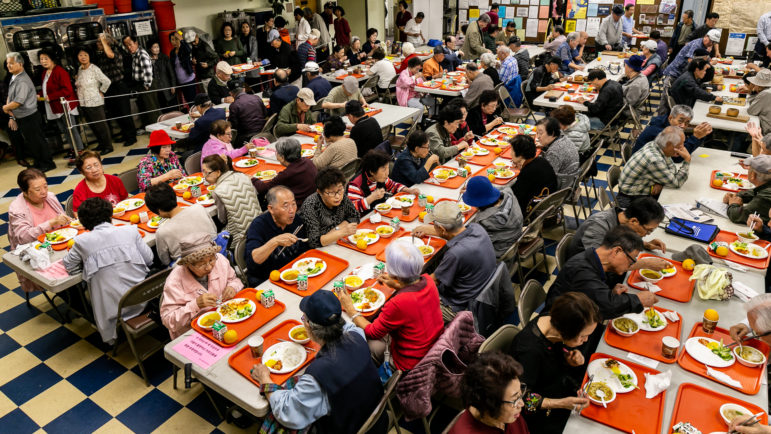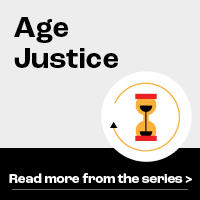
Judy Willig, Executive Director of Heights and Hills, which runs the Park Slope Center for Successful Aging as well as various services for homebound seniors, says she got an influx of texts informing her of Mayor de Blaso’s announcement Sunday that senior centers would be suspending group events due to COVID 19, as well as an e-mail from DFTA at 8 p.m. that evening.
Willig says Heights and Hills, like other senior services non-profits had planned on ending most congregate activities anyway as the outbreak progressed, and wanted to focus on handing out meals to seniors who are able to stop by.
On Monday, about 36 people came by her center to pick up meals, grateful that they were still being made available, she says. For those who aren’t already receiving home-delivered meals but are unable to make it to senior centers, some providers have expanded their service. As a precaution, Heights and Hills’ home-delivered meals provider is placing down meals, knocking on the doors of elders, then standing six feet back when they open the door.
Willig says while her seniors are mostly concerned about their physical health during this outbreak, as well as the availability of groceries and handheld items, there’s an additional concern about the mental health of seniors who are isolating at home. Many of her seniors may have no interaction with the outside world during this time except television news reports about the outbreak, which may worsen stress.
“If all you have is for companionship is the television and news, it can be quite frightening,” she says.
As NYC’s 250 senior centers halted all group services by order of the mayor on Monday in response to the COVID 19 outbreak, senior center directors have been thinking of ways to help seniors cope, to prevent residents from becoming too socially isolated and depressed.
Group programming at senior centers is closed indefinitely, according to the Department For The Aging, while the city monitors the COVID 19 outbreak. The city’s friendly visiting program, which matches up volunteers for what are normally home visits, is “fully operational but transitioning from in-person visits to virtual and tele-visits,” DFTA told City Limits by e-mail. DFTA’s mental health support and case management for elders will also continue over the phone.
Social adult day cares will also be closed for activities and will work to connect seniors who need them to home-delivered meals.
Caught by surprise
“I don’t think any of us were very well-prepared for something like this,” says Anya Herasme, Senior Director of Older Adult Services at PSS (originally known as Presbyterian Senior Services), which runs 10 senior centers in Harlem and the Bronx. “Even though I think we all kind of saw it coming, it feels very surreal.”
Herasme says PSS typically doesn’t close their senior centers for almost any reason, and learned about the mayor’s decision from an e-mail from advocacy group Live On NY on Sunday evening. Herasme says they were planning on restricting group activities anyway as the situation became more serious, and had already discussed providing meals for pickup, as the mayor said would be happening in his speech, because many of PSS’s seniors depend on them.
PSS has been keeping its seniors updated through a phone system that sends a recorded message to their home phones. Herasme says they’re also planning on implementing support groups and discussion groups over the phone so that people have some kind of social interaction.
“Some of these people only come out for the center and they don’t have other interaction,” she says. She’s considered using webinars, as well, but it’s not clear how many PSS seniors have computers at home to participate.
“We were actually working on a survey to figure that out before this happened. We were just a little late,” she says.
There are other unanswered questions. DFTA has been in constant communication asking for updates, discussing screening procedures, and exchanging information on how many people are sick, she says, but there hasn’t been clear guidance on other issues like payroll concerns, heightening uncertainty.
Social isolation a huge concern
Bobbie Sackman, an activist for older adults, says figuring out how to combat isolation of seniors is one of the biggest challenges, pointing out that isolation is a high predictor of morbidity among adults, comparable to smoking, high cholesterol and high blood pressure.
“It’s a killer. It literally is a killer,” she says.
Sackman suggests personalized phone check-ins with seniors who would otherwise be at senior centers, but points out the challenge of contacting many seniors by phone with so many languages spoken and only so many staffers to provide language assistance.
“I think that’s a huge, huge concern,” Katelyn Andrews, director of public policy at LiveOn NY, says of isolation. She says the group was never the less thrilled with the mayor’s announcement that group programming would be cancelled, because of the immediate health concerns for older adults, who are most vulnerable to COVID 19. “There had to be other ways to support seniors during this time,” she says.
Live On will hold a meeting next week where senior-center directors can share best practices and strategies for helping their seniors fight isolation. She’s already heard of senior center directors starting book clubs, with books that are accessible online and weekly check-ins.
And grassroots support have been stepping up as well. Zahara Zahav, a community organizer with Jews For Racial and Economic Justice, says they’ve been looking into creating networks where elders can connect by phone.
“Some of this is experimentation. We’re not really sure what’s going to work and what isn’t,” Zahav says.
Volunteers come forward; uncertainty remains
Willig, from Heights and Hills, says that she’s been working closely with Councilmember Brad Lander, who helped put out a call for volunteers. Five hundred people have signed up to volunteer with elder adults in the Lander’s district, which includes parts of Cobble Hill, Carroll Gardens and Windsor Terrace.
Willig was reassured by the outpouring of volunteers. “This really reminds you most people are very caring and believe in looking out for one another,” she says. She plans on utilizing volunteers to call and check in on seniors to see what their concerns are and whether they need food or medication, in which case professional staff would step in.
But Willig is still unsure about the road ahead. “It’s the not knowing,” she says, pointing out that other crises like Hurricane Sandy were finite events, whereas no one knows when the COVID 19 outbreak will end. “I think that’s what makes this crisis so different from other crises we’ve weathered in the past.”

CDC










One thought on “Senior Centers Scramble to Aid Clients Amid Coronavirus Shutdown”
Yes, we gonna need some help. We running out of food.